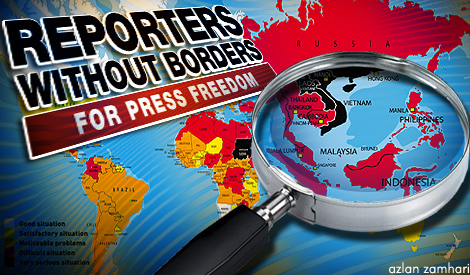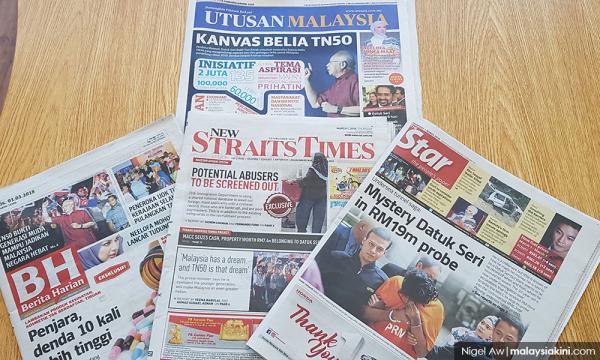The Printing Presses and Publications Act 1984 should be repealed rather than reviewed in order to improve press freedom standards in Malaysia.
In separate statements, several local media groups said while they welcomed Deputy Prime Minister Ahmad Zahid Hamidi’s reported promise that the government was prepared to consider amending the PPPA, they are of the view that the Act should instead be repealed.
During a luncheon with editors yesterday Zahid said the government will look at making improvements to the Printing Presses and Publications Act (PPPA) after the 14th general elections.
“We must make sure that the freedom to write and publish is not very restrictive according to current guidelines,” he said.
He also said he would meet media stakeholders to discuss the possibility of setting up a press ombudsman or media council.
The journalists' groups collectively welcomed the minister's recognition of a proposal by stakeholders to move towards self-regulation of the industry via a media council or other similar independent mechanisms.
The National Union of Journalists (NUJ) said the government had during the last general election promised to seriously look at the various draconian laws that constrict press freedom and threaten journalists.
The government also promised to facilitate the necessary changes and to advocate impartial neutral news coverage in order to meet the public's right to know, it added.
"The NUJ calls for the government to re-examine the issues curbing press freedom in Malaysia.
"Malaysia's press freedom development has been stagnant for the past 60 years and has seen a glaring decline with the system of one-party rule in Malaysia," said NUJ general secretary Chin Sung Chew in a statement.
On the proposed media council, Chin said the NUJ wants its formation to be free of government intervention in order to instil confidence in its independence.
"NUJ has concerns that the proposed media council is to be established as a statutory body and this arrangement is always prejudicial to the mind of the public as being linked to the government and thus not truly independent," he said.
"The media industry wants to see the government abolish the PPPA and other relevant laws with the setting up of an independent self-regulating media body so that professional journalism can be adhered to safe from any government interference," he stressed.
'Power abused'
In making its call, Chin said the NUJ strongly opposed any form of media manipulation by political parties or the government as Malaysia's declining press freedom ranking has been closely related to the perception of a non-democratic government.

"As we all know, the BN government controls the New Straits Times group, the Utusan Malaysia group is Umno controlled and MCA has The Star to call its own," he said.
"The print media has become the mouthpiece of the ruling parties instead of playing its role as a watchdog and mouthpiece of the people," he said, adding that this has resulted in the newspapers losing their credibility.
In a joint statement, the World Association of Newspapers and News Publishers (WAN-Ifra) Media Freedom Committee (Malaysia) and the Institute of Journalists Malaysia (IoJM) said the government now has an opportunity to repeal the PPPA as there was other existing legislation to deal with related challenges.
"With the Communications and Multimedia Act having provisions to deal with digital media, and the government also drafting a law specifically to deal with the fake news phenomenon, the opportunity is ripe to abolish the PPPA completely," said the group.
"With most traditional media houses already shifting their focus to a digital platform, the PPPA serves very little purpose apart from continuing to provide the government with the authority to take discretionary action against print publications in Malaysia," the two groups further said.
So long as discretionary authority continues to exist under the PPPA, the groups pointed out that the formation of any self-regulating media body in Malaysia would be redundant.
At the same time, the groups also noted that Zahid’s remarks came just over a month after several media editors had during a closed-door meeting agreed to pursue the idea of an independent, self-regulating Press Ombudsperson mechanism to be set up in Malaysia.
"The recognition by the deputy prime minister is a giant step following years of efforts from media practitioners in Malaysia to set-up a self-regulating structure," said the groups, adding that similar past dialogues had not proceeded to any real action.
Media group Gerakan Media Merdeka (Geramm), meanwhile, said that the power to revoke a printing permit had been abused in the past.
"We believe that the most contentious element of the Act is the need for a permit to publish as this could and has been used against publications viewed as critical of the government of the day.
"We also firmly believe that there are other existing laws which could be used to regulate contents of printed media and the government should return the right to publish without the need to apply for a permit," said Geramm in a statement.
The journalists' group was formed in 2014 following the suspension of newsweekly The Heat which has since ceased publication.


